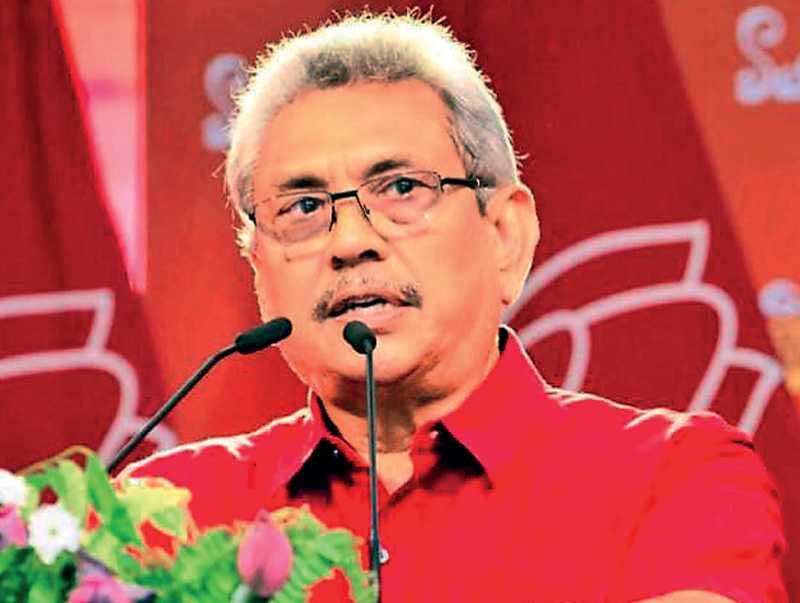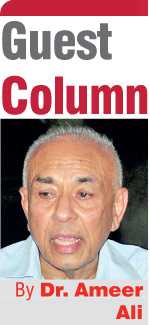Friday Feb 13, 2026
Friday Feb 13, 2026
Monday, 12 April 2021 01:13 - - {{hitsCtrl.values.hits}}

The best alternative to stop radicalisation is for the Government to take the Muslim community into its confidence and work with its members rather than treating the entire community as a security threat and suspect. This demands that NGR should extricate himself from the coterie of Islamophobes who surround him
 The Fuhrer of Nazi Germany found the Jews a problem, and he provided a final solution through gas chambers, which produced the historic Holocaust and the state of Israel. Nandasena Gotabaya Rajapaksa (NGR) is not a Fuhrer and Sri Lanka is not Nazi Germany, but in 2018, even before NGR became President, one of his top priestly acolytes was prepared to ennoble him as a local Hitler, and in that sense, the 20th Amendment cleared the way for NGR’s elevation.
The Fuhrer of Nazi Germany found the Jews a problem, and he provided a final solution through gas chambers, which produced the historic Holocaust and the state of Israel. Nandasena Gotabaya Rajapaksa (NGR) is not a Fuhrer and Sri Lanka is not Nazi Germany, but in 2018, even before NGR became President, one of his top priestly acolytes was prepared to ennoble him as a local Hitler, and in that sense, the 20th Amendment cleared the way for NGR’s elevation.
Since he was elected as President, one community of people that preoccupied his attention and that of his acolytes were Muslims. The horror of the April 2019 Easter tragedy, executed by a bunch of Muslim extremists acting on the direction of a mastermind, whose details and whereabouts still remain a mystery, and which no doubt benefited NGR’s presidential election victory, has obviously made the Muslim community a convenient target of blame not only for that horror, but also most if not all the evils plaguing the country.
Muslims were even accused of spreading the coronavirus. In that sense, forced cremation of COVID-19 dead Muslims may be viewed as punishment for bringing corona. However, this blame game predated NGR’s election, and the fact that it continues to this day must have given sufficient ground for the president to think that Muslims, like Jews in Fuhrer’s Germany, are a problem that requires a final solution. It was also reported recently that NGR is becoming increasingly despondent over his declining popularity. He may therefore think that going hard on Muslims and diverting the attention of his critics away from him, would be politically profitable.
NGR is a devout Buddhist with a military background. He has surrounded himself with military men. He also revealed, when addressing a crowd in Ampara in January this year, that he had another side to his character, which overpowered his Buddhist compassion to eliminate Prabhakaran and his Tamil militia. That was of course during a war. In contrast, Muslims are not at war with anybody, let alone the state. They just want to live in peace with all communities.
Yet, there is an anti-Muslim virus or Islamophobia that has infected NGR’s Viyathmaga, prominent members of his government, their supporters and sections of the Sangha. One of the prelates even urged his people to stone the Muslims. It was this group that also urged NGR to remove the Muslim Minister of Justice from the cabinet. The President is therefore under mounting pressure to act and act decisively to solve the Muslim problem.
It is as part of this solution that one should consider the Government measures to ban (a) books and writings authored by Muslim intellectuals such as Hassan al-Banna, Seyed Qutub, Abu Ala Maududi and so on (b) wearing of burqa and niqab, and Quran schools, and (c) the 11 Muslim organisations identified in the PCoI report (the same report also identified Bodu Bala Sena, but that has been left untouched). In a recent raid on a book store, which stocked 15,000 copies of the Quran, sample copies have been taken away by the police apparently to examine their content. When did the police become experts on the Quran? Yet, all these measures, according to the minister concerned, are intended to protect the security of the country, which, in other words, would mean that Muslims have become a security threat.
As a final step, NGR issued on 12 March 2021, a gazette notification under the Prevention of Terrorism Act 1979 aiming to open ‘re-integration centres for De-radicalisation’ of anyone ‘holding violent extremist religious ideology’. This notification was issued as the President’s response to act on the findings of the PCoI report. Because the provisions of the notification are related to the Easter massacre, it is reasonable to assume that Muslims would be widely targeted.
The main problem with the regulations stipulated in that notification is the absence of any precise legal definition of what is meant by violent extremism. The provisions of the Act are based on subjective considerations, and give a very broad choice for an officer to arrest anyone, ‘on suspicion of being a person who by words either spoken or intended to be read or by signs or by visible representations or otherwise, causes or intends to cause commission of acts of violence or religious, racial or communal disharmony or feelings of ill will or hostility between different communities or racial or religious groups’. It all depends on the values, prejudices and biases of the one who would make the arrest. In the context of the prevailing Islamophobia infecting even law enforcement officers, one can reasonably expect that the re-integration centres would soon be filled with more Muslims than others. These centres would be run by the military with instructions from the Minister of Defence, who is NGR.
This is also an already trodden path. It was when NGR was Secretary of Defence under MR’s presidency that rehabilitation measures were undertaken to de-radicalise Tamil ‘surrendees’ after the war. The process, program and period of rehabilitation were all under direct instructions of NGR, and studies undertaken later and based on interviews with the so-called rehabilitated have shown the inadequacies, uncertainties and ineffectiveness of the entire scheme (see for example, Ambika Satkunanathan, ‘The treatment of former combatants in post-war Sri Lanka’, in Fernand de Varennes, Christie M. Gardiner, Routledge Handbook of Human Rights in Asia, https://www.Routledgehandbooks.com/doi/10.4324/9781315720180.13). There is no guaranty that the same pitfalls would be absent from the repeat performance under the same chief. De-radicalisation may actually end up in radicalising the un-radicalised rather than the previously radicalised.
The best alternative to stop radicalisation is for the Government to take the Muslim community into its confidence and work with its members rather than treating the entire community as a security threat and suspect. This demands that NGR should extricate himself from the coterie of Islamophobes who surround him. With several other crises multiplying almost daily and compounding to erode the popularity of himself and his regime, whether NGR will have the guts to do this is the $ 64 k question?
(The writer is attached to the School of Business and Governance, Murdoch University, Western Australia.)